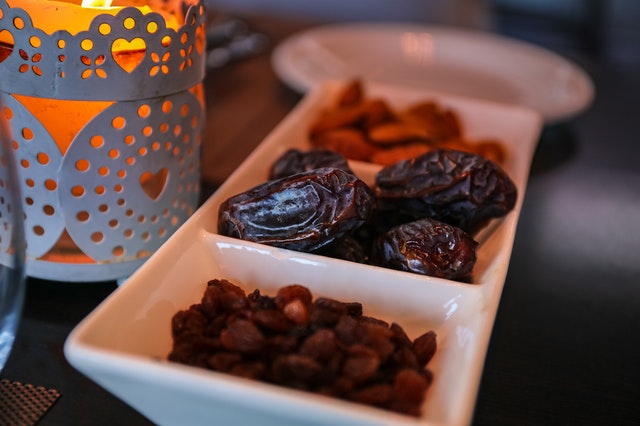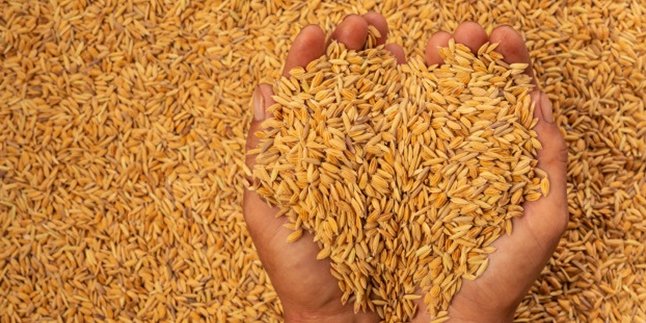Kapanlagi.com - Takjil is one of the foods that must be present during fasting in the month of Ramadan. Generally, in Indonesian society, takjil means a meal to break the fast. However, what does takjil mean, KLovers? Apparently, takjil means opening with reference to types of food to break the fast, KLovers.
Takjil itself means an activity or attitude to do something quickly. Well, before we discuss more about what takjil means, which is an activity to hasten, there are also sweet foods or takjil menu of Prophet Muhammad SAW that you can make as one of the healthy iftar menus.
Therefore, based on various sources, here's an explanation of what takjil means along with the iftar menu of Prophet Muhammad SAW. And also other terms in the month of Ramadan that we often hear. Let's check it out, KLovers.
1. Understanding Takjil

Illustration (credit: Pexels)
As previously explained, takjil is a name for a type of sweet food. The word takjil is taken from the Arabic language, ajjala-yu'ajjilu-ta'jilan, which means to hasten or hurry. The purpose of this hastening is to immediately break the fast that has been performed when the time comes.
It is also explained that the basic word for takjil is a word in Arabic, ajjala (transitive verb) which means to hasten. And it becomes a derivative word ta'jiil (abstract noun) which means to hasten in breaking the fast. Therefore, it can be concluded that takjil is an activity to hasten the breaking of the fast.
In Indonesia itself, the term takjil means a snack that is eaten shortly after breaking the fast, usually in the form of sweet foods such as banana compote, fruit soup, mixed ice, and so on. Then in the Minang language, the term takjil is known as pabukoan, which is a tradition of delivering takjil from a daughter-in-law to her mother-in-law called maanta pabukoan.
Actually, in Indonesia itself, the meaning of takjil is already suitable for the true purpose. Yes, sweet takjil food as an appetizer is indeed suitable for use as a form of takjil activity, which is to hasten breaking the fast with simple food first. And it's best to start with sweet food.
However, because it has become legendary, the word takjil is attached as a form of light food for breaking the fast for the Indonesian people. Thus, the word takjil is used for a form of food, not an activity in breaking the fast, which is to hasten.
2. Types of Takjil according to Prophet Muhammad SAW

Illustration (credit: Pexels)
If KLovers already know that takjil means the activity of hastening to break the fast. Here are some types of food of the Prophet Muhammad to do takjil activities in the holy month of Ramadan:
1. Dates
Dates are recommended food of Prophet Muhammad. It is recommended to consume dates in odd numbers. With natural sugar content, dates are very good for body health. Moreover, with a delicious sweet taste, dates also make the stomach full longer.
2. Olive
From Abi Usaid Al-Anshari, he said that the Prophet Muhammad said, "Eat olive oil!"
Indeed it is blessed. Use it and be anointed with it! Indeed it comes out of a blessed tree." (HR.Ahmad, Ad Darimi and Tirmidzi).
3. Fig
Figs are very much liked by Prophet Muhammad, and he once said that figs are the fruit of paradise without seeds. Its many benefits such as being able to treat constipation, intestinal diseases, boils, and stomach make this fruit very suitable for consumption when breaking the fast.
4. Pomegranate
Pomegranate is one of the list of fruits of paradise, which is mentioned in sura Ar-Rahman verse 86 which means, "In both of them are fruit, palm trees and pomegranates."
5. Truly, it is blessed. Enjoy it and anoint with it! Indeed, it comes from a blessed tree." (HR.Ahmad, Ad Darimi and Tirmidzi).
3. Fig
The fig fruit is very much liked by Prophet Muhammad SAW, and he once said that the fig is a fruit of paradise without seeds. Its many benefits such as being able to treat constipation, intestinal disease, boils, and stomach make this fruit very suitable for consumption when breaking the fast.
4. Pomegranate
The Pomegranate is one of the fruits of paradise, listed in sura Ar-Rahman verse 86 which means, "in both gardens there are fruits, date palms and pomegranates."
5. Grapes
Grapes became one of Prophet Muhammad's favorite foods when breaking the fast. This is not surprising because grapes indeed have many benefits for health. Especially with the vitamin C content in grapes that can increase the body's immunity.
6.Honey
Consuming honey after breaking the fast can maintain blood sugar levels and is very good for health. Its sweet taste is also often used as a substitute for sugar which is certainly healthier.
7.Milk
Milk is not only a menu for breaking the fast of Prophet Muhammad, but also during suhoor. With the vitamin content in milk, it can maintain your body's fitness all day long. A glass of milk contains protein and calcium which are very good for body health.
3. Other Terms during Ramadan

Illustration (credit: Pexels)
After knowing that takjil means to hasten breaking the fast, KLovers also need to know other things in the month of Ramadan. And here are some other terms in Ramadan along with their meanings:
1.Sahur
Sahur is a term in Islam that refers to the activity of eating and drinking carried out by Muslims in the early morning for those who will fast during the month of Ramadan on that day.
2.Imsak
The definition of Imsak is taken from the Arabic language, namely amsaka yumsiku imsak which means to hold back. From the meaning of holding back, it can be concluded that the time of Imsak is the beginning of holding back everything that invalidates the fast.
3.Iftar
Iftar means breaking the fast. The word iftar itself comes from Arabic which means breaking the fast. Literally, iftar means "breakfast". Iftar is also known as ftoor. Iftar will be done to end the Ramadan fast every day at sunset.
4. Tarawih
Tarawih or tarawih prayer is a sunnah prayer worship that is specifically performed in the month of Ramadan. Tarawih in Arabic is a plural form that is interpreted as 'a momentary time for rest'. The time for performing this sunnah prayer is after isya and before dawn, usually done in congregation in the mosque.
5. Shaum
Shaum is an Arabic term that means fasting. Ramadan shaum is the obligatory shaum for Muslims. Shaum or fasting for Muslims is to refrain from eating and drinking and all acts that can invalidate the fast, from dawn until sunset.
6. Zakat fitrah
Zakat fitrah is a personal zakat that is mandatory for Muslim individuals who have met the requirements. Zakat fitrah must be fulfilled by Muslims who have met the requirements. Zakat fitrah must be paid once a year at the beginning of Ramadan until the limit before Eid al-Fitr prayer. Zakat fitrah that has been paid will be distributed to the recipients of zakat fitrah.
7. Fidyah
Fidyah comes from the word 'fadaa', which means to replace or redeem. Fidyah is a way for someone with certain conditions to replace missed Ramadan fasts by feeding the poor. Fidyah can only be done by someone who is no longer able to fast for a long period of time or even permanently.
8. Ngabuburit
The term ngabuburit during Ramadan is not unfamiliar to Indonesian society. The term ngabuburit is known to come from the Sundanese language, which means burit or late afternoon before maghrib. Ngabuburit is usually done with activities such as walking around, looking for takjil (snacks for breaking the fast), studying, doing social activities, listening to religious lectures, and so on.
9. Itikaf
And the last Ramadan term is Itikaf. Yes, Itikaf is staying or residing in the mosque with the intention of worshiping to get closer to Allah SWT. Itikaf can be done anytime but it's better to do it during the night of Lailatul Qadar, which is the last ten days of Ramadan.
That's a little explanation of takjil which means hastening to break the fast along with the types of food for breaking the fast of the Prophet Muhammad SAW and other terms in the month of Ramadan. Hopefully, the above explanation can be a new knowledge for KLovers.
(kpl/gen/dhm)
Disclaimer: This translation from Bahasa Indonesia to English has been generated by Artificial Intelligence.















